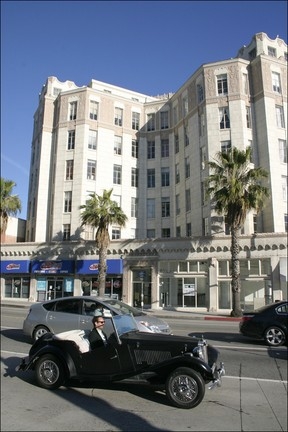
CITY HALL — Decision makers and the community need more information, and earlier, if they’re going to get appropriate concessions out of developers bent on building projects that exceed normal zoning rules, the City Council said Tuesday.
The concessions, called “community benefits,” are extras like parks, community rooms and other facilities that City Hall negotiates into contracts with developers in return for special permission to build taller and more massive buildings.
Of late, Santa Monica’s City Council has flirted with more exotic benefits, including a controversial living wage provision for workers at the three new hotels coming in on Wilshire Boulevard and at Fifth Street.
But if council members and city commissioners hope to get a good deal for residents in exchange for projects that potentially bring more congestion and other maladies, they need to know not only what they can ask for, but what the community wants.
On Tuesday, council members told city planners that the process for both of those critical components is lacking.
Coming up with an appropriate amount of concessions to negotiate with a developer is near impossible when you don’t know how much extra they’ll be making for crossing the zoning lines, Planning Commissioner Ted Winterer told council members during public comment.
“I feel like we’re swimming upstream based on what we think on gut analysis of the project is an appropriate amount of community benefits,” Winterer said.
A certain amount of development is allowed by right on almost any parcel of land, depending on what City Hall decreed could go there in the zoning code.
Building above that ostensibly means a more profitable project, and it’s critical for officials to balance the amount of benefits they ask for with the extra profit a developer will receive as a result of the larger scale.
The commission has asked for a report on that differential in the past, but so far it hasn’t been delivered by staff, Winterer said.
The subject was near and dear to Councilmember Bobby Shriver’s heart. In previous meetings, Shriver has consistently asked for estimates of what developers get out of the deal.
He used the point to argue for a higher living wage for future workers at the hotel slated for 710 Wilshire Blvd., arguing that given the amount of profit the hotel owner was expecting in the first year of ownership, he could afford what the council was asking.
“The vagueness of this has bothered me since we started,” Shriver said.
Benefits vary project to project, in part because each project can handle a different amount of additional financial burden and because each development agreement is cut from whole cloth, more or less undetermined by agreements that came before it.
They’re also supposed to be tailored to the type of project and the needs in the part of the city that will play home to the new development.
Finding out what the people who live near those developments want in their neighborhoods has also been a chancy process that needs improvement, council members said.
Community benefits are almost never discussed with the public when projects first get introduced, said Mayor Pro Tem Gleam Davis.
“When they are discussed, it’s an open-ended question: What do you want as a community benefit?” she said. “There’s no attempt to gain consensus.”
That leaves decision makers saddled with a disparate list of potential benefits to include with no way of knowing how much the community really values them.
Rachel Torres, an analyst with the UNITE HERE! Local 11, a union that represents hotel workers, held that getting community voices in the room early and often will help ensure that what the council requests will actually serve its constituents.
“We have to set expectations for what we want to see in projects early on and have community stakeholders in the room early so community benefits accurately reflect the community’s interests,” Torres said.
At the same time, relying too heavily on the early float-ups can give special interest groups a chance to crowd meetings, stacking the deck against those who also hope to get their voices heard, said Councilmember Pam O’Connor.
The warning was born out Tuesday night. Council chambers were packed with union members and others who came to speak in support of a living wage for the three hotels on the docket for the evening.
They were disappointed by the wage council set at its last meeting for the hotel slated for Wilshire Boulevard, and arrived to speak to it and the rate for the additional two hotels coming in at the intersection of Colorado Avenue and Fifth Street.
Both are required to have a living wage provision as part of the deal struck with Alexander Gorby, owner of the property at 710 Wilshire Blvd.
City planners will take the council’s input to help create a policy to try to include more community voices and standardize development agreements to some degree.
ashley@www.smdp.com









